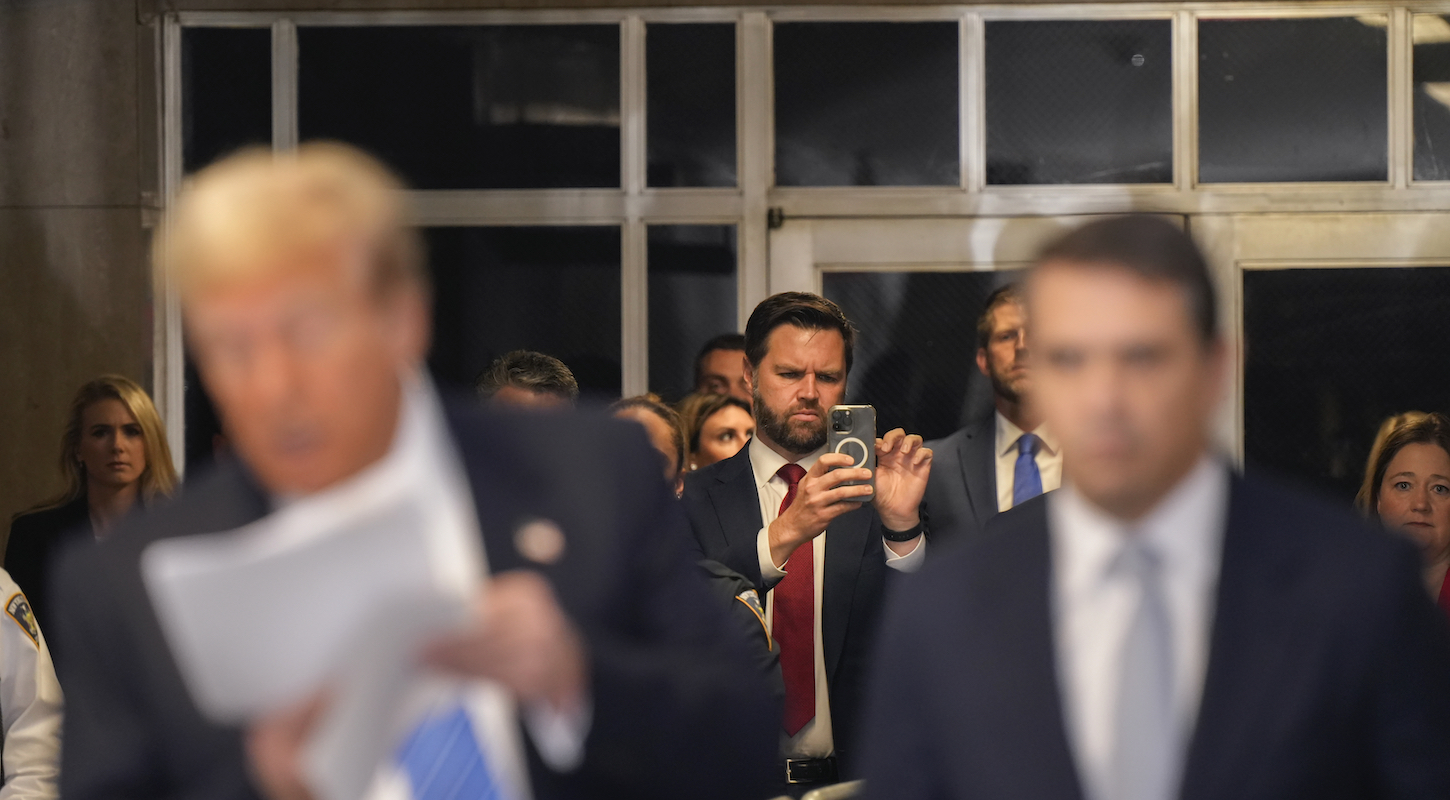Welcome to Margin of Error, a politics column from Tom Scocca, editor of the Indignity newsletter, examining the apocalyptic politics and coverage of Campaign 2024.
On Monday, Sen. J.D. Vance, the Appalachian memoirist from the suburbs of Dayton, showed up at Donald Trump's criminal trial in Manhattan wearing a blue suit and plain red necktie, and proceeded to say the sorts of things that a gag order is supposed to be preventing the defendant from saying in public anymore. As the week went on, more synthetic Trumps kept showing up, a parade of major and minor Republican figures—some of them major and minor at the same time, like House Speaker-by-default Mike Johnson, or the media-penetrating failed presidential primary candidate Vivek Ramaswamy.
The men were decked out like Vance, which is to say like costume-store versions of Trump, to varying degrees of fidelity. Johnson finessed it with a striped tie in equal proportions of red and navy, but with the red naturally catching the eye; centimillionaire Florida Sen. Rick Scott, who turned up last week, went with a red-dominated repp tie. But a Tuesday lineup of Ramaswamy, Florida Reps. Byron Donalds and Cory Mills, and North Dakota Gov. Doug Burgum stood shoulder to shoulder in nearly matching, fully blank red neckwear, like groomsmen, or backup singers looking for a band.
Or—in the most widespread interpretation—they looked as if they were auditioning for a part. Specifically, they were supposed to be auditioning for the role of Trump's running mate. This seemed like a reasonable reading of the spectacle, but the details were hard to pin down. Under its heading about "VP contenders," Bloomberg directly named only Burgum and Vance as potential picks; the Guardian also included Donalds and Ramaswamy as "VP hopefuls."
"Hopeful" was probably the more accurate word choice. To call someone a "contender" for the job feels like a category error: It would mean that they were clearly competing in some defined contest, and that they could be identified as someone with a chance to win.
None of those conditions really appear to apply to the process of becoming the 2024 Republican vice-presidential nominee. Donald Trump's running mate is going to be whomever Donald Trump picks as his running mate. The only ups and downs, twists and turns, or shifts of momentum are happening in the well-known yet incomprehensible storm-tossed desert of Trump's interior life.
When South Dakota governor Kristi Noem ("Trump VP contender Kristi Noem") wrote, or had her ghostwriter write, about going on her puppy-and-goat-killing spree, the news cycle was all about how Noem seemed to have ruined her chance at joining Trump on the ticket. Certainly it was difficult to imagine Trump picking the puppy-killer as his running mate—not because he loves animals, but because he so visibly loathes animals that the idea of becoming entangled enough with a dog to end up shooting it in a gravel pit must be revolting to him.
But to try on Trump's psyche for long enough to work through the implications of the puppy murder is to realize how unlikely Noem would have been in the first place. She's a woman, and she tries to present herself for the male gaze, and Trump's male gaze is, even by the standards of the male gaze, contemptuous toward women. She's from the kind of state that has guns and goats and gravel pits. What would she be able to do for him?
And then, by extension, what would any of them be able to do for him? Who could possibly give him what he wants? The problem with picking Trump's vice president is the problem with the entire concept of a second Trump presidency. In theory, the Republican vice-presidential selection is the last major plot point in normal electoral politics between now and the voting. In practice, it's Trump's attempt to write a new ending to Jan. 6, with a new cast.
The first, non-negotiable thing that Trump wants in a running mate is the guarantee that there won't be another Mike Pence—that his new vice president would never turn against him, no matter what the law or constitutional duty might say. Already, under pressure from Trump, Republicans are refusing to say they'll accept the results of this year's balloting. He needs a crook he can trust.
Does J.D. Vance believe that Donald Trump would believe he could be that person? Eight years ago, he was calling Trump "reprehensible" and "an idiot." Trump loves when his former critics crawl for him, but every obsequious line out of Vance's mouth now is just a demonstration that he will say or do anything to advance himself. The same impulse that made Vance show up at the courthouse in a red tie would make Vice President Vance reach for the 25th Amendment if he saw an opening, and Donald Trump wouldn't be Donald Trump if he couldn't smell that on him.
To game these scenarios out is to realize that the game itself makes no sense. As Lin Biao and Liu Shaoqi discovered, being the No. 2 in a one-man cult of personality is no job at all. Trump needs a running mate who is combative yet submissive, safely weak but not pathetic, entertaining at the rallies without craving the spotlight. He needs someone who is more than a parasite on his own success, but less than an independent personality. He needs a running mate who is a negative space in the precise shape of Donald Trump; he needs someone who could put on a costume, because it was a costume, and somehow make people believe it was clothes.





